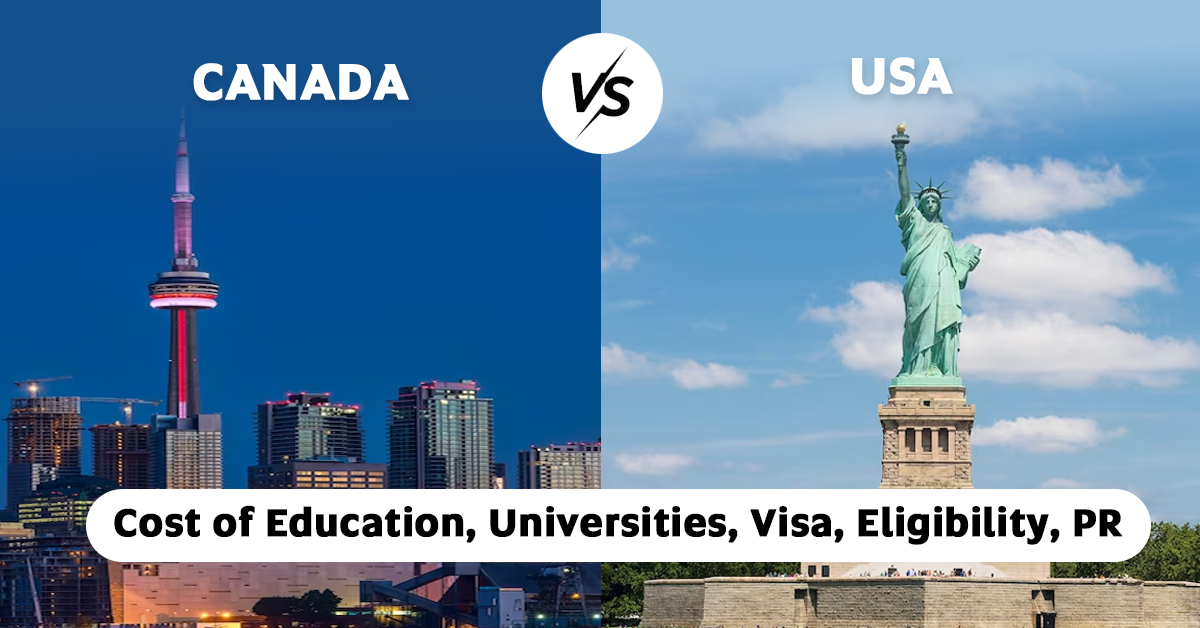
Updated On: 25 October 2025
Canada vs USA – Cost of Education, Universities, Visa, Eligibility, PR
USA and Canada are the top study abroad destinations, with renowned and prestigious education institutions, diverse environments, research-oriented and innovative curriculums and top-ranked universities. However, there are some significant pros and cons of studying in either of the two countries. To make an informed decision, students should consider factors like eligibility, student visa, cost, and job opportunities.
Read More: Study Abroad 2026: Essential Guide for Parents
Country Highlights
| Parameters | The USA | Canada |
|---|---|---|
| Currency | US Dollars (USD) | Canadian Dollars (CAD or CDN) |
| Average cost of studying | USD 50,500 p.a. | CAD 12,000 - CAD 30,000 p.a. |
| Average cost of living | USD 46,000 | CAD 20,000 to CAD 30,000 |
| Part-time working hours | 20 hours / week | 20 hours / week |
Cost of Education
The USA is known for its higher costs of studies and costlier living expenses. Meanwhile, studying and living expenses in Canada are comparatively cheaper. The cost of living in a US city will be much higher than in a Canadian city. However, the cost changes in many scenarios, like living in a suburban US vicinity will be much less than living in a city like Toronto in Canada. There is no single conclusion on the cost. Let us look at the comparative studies based on the cost of studying.
Cost of Education for UG Courses USA vs Canada
| Particulars | Undergraduate course in the USA | Undergraduate course in Canada |
|---|---|---|
| Tuition fee | 27 Lakhs per year | 21 Lakhs per year |
| Course Duration | 4 years | 4 years |
| Living expenses | 11 Lakhs per year | 11 Lakhs per year |
Cost of Education for PG Courses USA vs Canada
| Particulars | Undergraduate course in the USA | Undergraduate course in Canada |
|---|---|---|
| Tuition fee | 23 Lakhs per year | 11 Lakhs per year |
| Course Duration | 2 years | 1-2 years |
| Living expenses | 11 Lakhs per year | 7 Lakhs per years |
Best Student Cities
The USA and Canada are two of the most sought after study abroad destinations for the international students.
Best Student Cities to study in the USA
| QS Ranking 2023 | City |
|---|---|
| 11 | Boston |
| 18 | New York |
| 27 | San Francisco |
| 30 | Los Angeles |
Best Student Cities to study in Canada
| QS Ranking 2023 | City |
|---|---|
| 14 | Montreal |
| 15 | Toronto |
| 20 | Vancouver |
| 55 | Ottawa |
Universities
While The United States of America is the home to the top-ranked global universities, on the other hand, Canadian Universities are one of the most preferred study-abroad destinations in the world.
Universities of the USA
From the Ivy League to the prestigious American universities, American universities hold a better global rank and prestige. They offer varied specialisations and courses, including industry-specialised courses. The USA is the home to the world's famous and top universities, such as Stanford University, Harvard University, Massachusetts Institute of Technology and Yale University.
Universities of Canada
Canadian Universities are among the most sought-after destinations to study varied courses and programs. They have a diversified range of specialisations and courses for graduates from every field. Some famous Canadian universities are the University of Toronto and the University of British Columbia.
Eligibility Criteria
International students willing to apply for admission to the USA or Canada needs to fulfil a certain set of admission requirement, based on the level of course, degree opted for. The eligibility criteria requirements for the USA and Canada differ from to some extent.
Eligibility criteria for the USA
The Eligibility criteria to study in the USA are stricter in comparison to Canada. To apply for graduation courses, Indian students need to complete 12 years of schooling, along with SAT and ACT scores. The Minimum score requirement for the IELTS is 6.5, and 600 for the TOEFL. The minimum GRE score required to gain admission to any American university is 290. To get admission to management courses, students need to have a GMAT score. Meanwhile, for science courses, students need to profile a valid GRE score.
To apply for post-graduation courses, students must have a required Bachelor's degree in the relevant field with an average of 70 % marks. A letter of recommendation from at least two faculty members is also required. A few universities also require work experience for admission to post-graduation.
Eligibility criteria for Canada
The eligibility criteria for studying in Canada are flexible in comparison to the USA. A majority of Canadian universities require English proficiency test scores; 6.5 is the minimum IELTS score, and for TOEFL it is 550. While other entrance tests like the GRE and GMAT are compulsory for Canadian Universities, an SAT examination score is essential for admission to undergraduate courses.
Indian students need to have a valid graduation degree certificate with a minimum of 50 % from a UGC - UGC-recognised College to take admission to post-graduate courses.
Student Visa
International students who wants to pursue their studies abroad are required to apply for student visa.
Student Visa in the USA
US full-time students need an F1 visa which requires a personal interview and biometrics. The student can stay in the US 90 days after their program ends, unless approved to stay and work under the OPT Program. The visa application fee is $160 plus a $350 SEVIS fee. Dependents cost $160 each. Students can work 20 hours a week and 40 hours during holidays/breaks. On-campus work is only for commercial firms that gladden the college.
Student Visa in Canada
When applying for a Canadian student visa, there are a few important regulations to keep in mind. You must apply for a post-graduation work permit within 90 days. Spouses can work full-time if your stay is for a year or more. The cost of the visa is C$150 + C$80 (biometric). You can work up to 20 hours per week, or up to 40 hours per week during holidays, breaks, and summer sessions.
Post-Study Work Visa
The USA and Canada offer an ample number of lucrative opportunities and enormous growth. International students who wish to stay back after Graduation to work full time will have to apply for a post-graduate work visa; the latter is one of the reasons that makes both countries popular for studying abroad. Both countries have their own set of norms for work permits.
Post-Study Work Visa in the USA
International students can stay back after completing their course only if they have the option to do so through OPT, which is a temporary employment permission allowing students to work for 12 months (study work permit) in their respective field of study. International students can apply for OPT only after being enrolled for at least 9 months. However, you can only begin employment once you receive the Employment Authorization Document. International students can apply for a Work Visa upon getting a permanent full-time job. Like F1 Student visa holders are allowed to work for 1 year under temporary employment, students who study STEM courses are given 3 years of stay back option.
Post-Study Work Visa in Canada
The postgraduates are allowed to work for 3 years after completing their course. One of the benefits that Indian students can enjoy in Canada is the Post-Graduation Work Permit, which allows them to stay back in Canada. This also adds extra perks to get the status of Permanent Residence and settle in Canada
Job profiles in The USA and Canada
Canada and the USA are two of the most chosen study-abroad destinations by international students, mostly Indians, because of its lucrative job market where certain jobs are popular and in high demand.
| Popular Jobs | Average Salaries in the USA (USD) | Average Salaries in Canada (USD) |
|---|---|---|
| Aerospace Engineering | 128, 000 | 116, 000 |
| Business Analyst | 125, 000 | 120. 000 |
| Civil Engineer | 88, 000 | 81, 000 |
| Financial Analyst | 126, 000 | 121, 000 |
| HR Manager | 148, 000 | 135, 000 |
| Project Manager | 124, 000 | 97, 000 |
Some popular job sectors in the USA include Information Technology, Real Estate, Healthcare, Education, E-commerce and Tourism. Meanwhile, in Canada, Web-Developer, Nursing, Engineering, Human Resources, Information Technology project management, Pharmacy, and Biological Science.
Permanent Residency
After completing higher studies, many international students prefer to stay back due to the remunerative pay packages, better standard of living and lucrative facilities. Permanent Residency in the USA and Canada is possible. However, the process and eligibility are different. In USA, there are Green Card Holders, while in Canada, there is Express Entry.
Permanent Residency in the USA
Permanent Residency in the USA is possible, yet the process is very complicated and slow. The Permanent Residency in the USA is known as a Green Card (as a proof of status), granted by the US Citizenship and Immigration Services and a green card holder is given the authorisation to live and work in the USA on a permanent basis.
After completing studies, an international student with an F1 Student Visa can opt for OPT (Optical Practical Training). While working under the OPT, students can apply for a Green Card after residing in the country for at least five years on the grounds of employment.
Permanent Residency in Canada
Compared to other countries, getting PR in Canada is easy. Permanent Residency is easy with a Post Graduate Work Permit in Canada. If you have a valid PGWP and have worked for at least one year, you can apply for a PR under the Canadian Experience Class.
Canada needs more highly skilled employees as the country is sparsely populated. Hence, student's skill sets or employment should come under Skill Type 0 or Skill Level A or B under the National Occupational Classification System.
Taxes
The average sales tax rate in the US is 7.23%, but some states have rates as high as 9.75%. Canada has a national sales tax of 5 %, while the USA has a patchwork of state and local sales taxes. Canada is more affordable than the USA; however, the USA has a higher median income.
Taxes in the USA
F1 Visa holders are non-residence holders who must find their income under the USA tax return. Students earning in the USA also need to pay taxes whether they are making online or from offline sources.
Taxes in Canada
International students must pay taxes if they are earning in Canada, whether the income is being received from outside the country. However, the amount earned from various internships, freelance projects, and research fellowships is also counted as a source of income.
Conclusion
Reach out to SIEC for Application inquiries and assistance.
Read more insightful articles:
Study in Canada: Course, scope and cost of studying
How Indian students can adapt to Canada new visa regulations?



Comments (0)
Leave a Comment